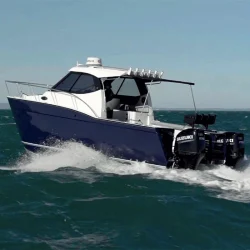Tips for a successful and enjoyable recreational boat fishing experience
2024-03-29
Recreational boat fishing is a popular and enjoyable activity for anglers of all skill levels, offering the opportunity to catch a variety of fish species in lakes, rivers, coastal waters, and offshore areas. Whether you're fishing for relaxation, sport, or to catch dinner, here are some tips for a successful and enjoyable recreational boat fishing experience:
1. Obtain the Necessary Licenses and Permits: Before heading out on the water, ensure that you have the appropriate fishing licenses and permits required by your state or country. Familiarize yourself with fishing regulations, size limits, and catch limits for the species you intend to target.
2. Choose the Right Fishing Gear: Select fishing gear appropriate for your target species and fishing environment. This may include fishing rods, reels, lines, hooks, lures, baits, and tackle boxes. Consider the size and strength of your equipment based on the fish species you expect to encounter.
3. Prepare Your Boat: Ensure that your boat is properly equipped and maintained for fishing. Check that your boat's engine, navigation lights, electrical systems, and safety equipment are in good working condition. Stock up on essential supplies such as fuel, water, sunscreen, and emergency gear.
4. Select Fishing Locations: Research and identify productive fishing spots based on the species you want to catch, local fishing reports, tide charts, and bathymetric maps. Look for areas with underwater structures, drop-offs, channels, reefs, or weed beds where fish are likely to congregate.
5. Use Proper Boat Positioning: Position your boat strategically to maximize your chances of catching fish. Drift fishing, anchoring, trolling, and casting are common techniques used to target different fish species and habitats. Pay attention to water depth, current flow, wind direction, and natural features that may influence fish behavior.
6. Practice Safe Boating: Prioritize safety while boating and fishing to prevent accidents and injuries on the water. Ensure that all passengers wear properly fitting life jackets and follow boating safety rules and regulations. Maintain a safe distance from other boats, navigational hazards, and swimming areas.
7. Experiment with Different Techniques: Try a variety of fishing techniques and presentations to entice fish to bite. This may include casting, trolling, jigging, bottom fishing, fly fishing, or using live bait, artificial lures, or flies. Pay attention to water conditions and adjust your tactics accordingly.
8. Practice Catch and Release: Consider practicing catch and release to conserve fish populations and promote sustainable fishing practices. Handle fish carefully and use appropriate release techniques to minimize stress and injury to the fish. Keep only what you intend to consume and follow local fishing regulations regarding size and bag limits.
9. Stay Patient and Persistent: Fishing requires patience and persistence, as success is not guaranteed on every trip. Be prepared to adapt to changing conditions, try different approaches, and stay positive even if the fish aren't biting. Enjoy the experience of being out on the water and appreciating nature's beauty.
10. Respect the Environment: Practice responsible angling and environmental stewardship by minimizing your impact on the marine ecosystem. Dispose of trash properly, avoid damaging sensitive habitats, and follow Leave No Trace principles while enjoying the outdoors.
Recreational boat fishing offers a rewarding and memorable experience for anglers, allowing them to connect with nature, hone their fishing skills, and create lasting memories with friends and family. By following these tips and practicing ethical fishing practices, you can maximize your chances of success while enjoying the beauty and tranquility of the waterways.



